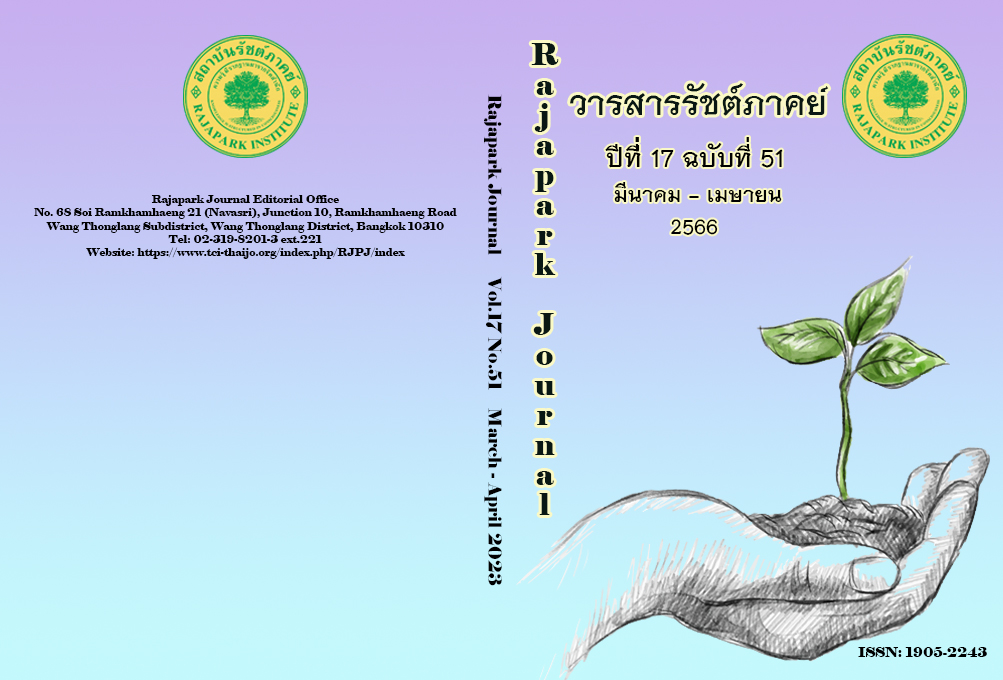อิทธิพลของจุดสัมผัสที่มีต่อความภักดีของลูกค้าชาตรามือ
Main Article Content
บทคัดย่อ
การวิจัยครั้งนี้เป็นการวิจัยเชิงปริมาณ มีวัตถุประสงค์เพื่อ (1) ศึกษาระดับความคิดเห็นเกี่ยวกับจุดสัมผัสและระดับความภักดีของลูกค้าชาตรามือ (2) เปรียบเทียบระดับความภักดีของลูกค้าชาตรามือ จำแนกตามปัจจัยส่วนบุคคล และ (3) เพื่อศึกษาตัวแปรจุดสัมผัสก่อนการซื้อ ระหว่างการซื้อ และหลังการซื้อที่มีผลต่อความภักดีของลูกค้าชาตรามือ ประชากรที่ใช้ในการศึกษา ได้แก่ ลูกค้าที่ซื้อสินค้า “ชาตรามือแบบใส่แก้วพร้อมดื่ม” ในเขตกรุงเทพมหานครและปริมณฑล สุ่มกลุ่มตัวอย่างแบบเจาะจง (Purposive Sampling) ขนาดกลุ่มตัวอย่างจำนวน 400 คน เครื่องมือที่ใช้ในการวิจัยเป็นแบบสอบถามมีค่าความเชื่อมั่นเท่ากับ 0.964 สถิติที่ใช้ในการวิเคราะห์ข้อมูล คือ ร้อยละ ค่าเฉลี่ย ส่วนเบี่ยงเบนมาตรฐาน การทดสอบความแตกต่างค่าเฉลี่ยด้วย t – test การวิเคราะห์ความแปรปรวนทางเดียว One – way ANOVA และการวิเคราะห์การถดถอยพหุคูณ ผลการวิจัยพบว่า (1) ระดับความคิดเห็นเกี่ยวกับจุดสัมผัสและระดับความภักดีของลูกค้าชาตรามือ โดยภาพรวมและรายด้านอยู่ในระดับมาก (2) ระดับความภักดีของลูกค้าชาตรามือ จำแนกตามปัจจัยส่วนบุคคล ไม่มีความแตกต่างกัน และ (3) จุดสัมผัสระหว่างการซื้อ (X2) และจุดสัมผัสหลังการซื้อ (X3) เป็นตัวแปรที่สามารถทำนายความภักดีของลูกค้าชาตรามือได้ร้อยละ 47.90 โดยมีสมการการทำนาย คือ Y = 1.016 + 0.544(X2) + 0.187(X3)
Article Details

อนุญาตภายใต้เงื่อนไข Creative Commons Attribution-NonCommercial-NoDerivatives 4.0 International License.
ทัศนะและความคิดเห็นที่ปรากฏในวารสาร ถือเป็นความรับผิดชอบของผู้เขียนบทความนั้น และไม่ถือเป็นทัศนะและความรับผิดชอบของกองบรรณาธิการ
เอกสารอ้างอิง
Bolton, R. N., Gustafsson, A., McColl-Kennedy, J., Sirianni, N. J., & Tse, D. K. (2014). Small Details that Make Big Differences: A Radical Approach to Consumption Experience as a Firm’s Differentiating Strategy. Journal of Service Management, 25(2), 253-274.
Cherdboonmuang, S., & Sawang, S. (2018). The Development of Perception-Based Model for Customer Loyalty in Modern Convenience Store Brand in Bangkok. Journal of Business Administation: The Association of Private Higher Education Institutions of Thailand,
(Special), 57-72.
Duncan, T. (2005). Principles of advertising & IMC (2nd ed.). McGraw-Hill.
Hayes, B. (2014, April 1). Customer Loyalty is Alive and Well. Business Over Broadway: B.O.B. http://businessoverbroadway.com/2014/04/01/customer-loyalty-is-alive-and-well/
Issara, D. (2017). Experiential Journey of Modern and Traditional Retail Service in Small Town: A Case Study of Eastern Lanna Customer[Doctoral Dissertation, Naresuan University].
Jarusan, P. (2017). Connect to Library Service with CEM: A Case Study of Sukhothai Thammathirat Open University Library. PULINET Journal, 4(1), 89–95.
Kittinorarat, J., & Paholpak, J. (2019). Service Quality and Building Customer Loyalty: The Contextual Components of Mobile Phone Service Operators in Thailand. Journal of Economics and Management Strategy, 6(1), 135–151
Khani, A. H., Khajeh, H. B., & Aali, S. (2014). Studying the relationship between customer relationship management and relationship marketing at Iran Melli Bank of Metropolitan Tabriz: Spring 2013. Indian Journal Science, 3(1), 400–407.
Khunrat, P. (2020). Story of Ready to Drink Tea Business in Thai Society from the 1990s until the 2010s[Master’s Thesis, Srinakharinwirot University].
Myongjee, Y., & Billy, B. (2013). Customer loyalty marketing research: A comparative approach between hospitality and business journals. International Journal of Hospitality Management, 33, 166–177.
Opasbutr, T., & Pornwasurat, P. (2020). Customer Experience Management on the “New Normal”. Siam Communication Review, 19(2), 169–180.
Pankeaw, P. (2016). Service Marketing Mix Factors Affecting Customer Loyalty of Using Services of Government Savings Bank in Kanchanaburi Office[Independent Study, Kanchanaburi Rajabhat University].
Phakakarvathin, S., & Sucher, W. (2019). Application of Marketing Innovation: Success of Traditional Thai Tea (Cha Tra Mue). In Proceeding The 3rd National Academic Conference (pp. 274–284). Graduate School of Tourism Management, NIDA.
Phensuk, T. (2018). Factors Affecting Consumer Decisions about Cha Tra Mue Brand Thai Tea Mix[Independent Study, Thammasat University].
Phongjirakhorn, C., Nonthanathorn, P., Laohavichien, T., & Srivardhana, T. (2020). The Relationship of Social Media Influencer, Customer Experience Management, Customer Engagement and Service Brand Evaluation to Brand Trust in Beauty Clinic Business.
Srinakharinwirot Business Journal, 11(2), 89–111.
Puttes, R., & Wetprasit, W. (2021). The Structural Relationship of Marketing Strategies, Service Quality and Corporate Image Perception that Affects the Customer Loyalty of the Electronic Commerce Group of Thai Post Company Limited, Phetchaburi Province. Academic Journal of Phetchaburi Rajabhat University, 11(1), 175-186.
Rangyai, T. (2017). Loyalty Model of Hotel Business customer in Bangkok Metropolis and Perimeters. Academic Journal Phranakhon Rajabhat University, 8(1), 41–51. https://so01.tci-thaijo.org/index.php/AJPU/article/view/63817
Rungkrajang, T., & Supornpraditchai, T. (2016). Customer Experience of Thai Stamp Members Related to Brand Loyalty of Thailand Post Company Limited. Panyapiwat Journal, 8(1), 67-78.
Sakdaar, P., & Chaiwongkeat, C. (2020). Measuring Customer Loyalty for Airline Business. Journal of Management Sciences, Surat Thani Rajabhat University, 7(1), 1-24. https://so03.tci-thaijo.org/index.php/msj/article/view/243750
Silanoi, L. (2017). How to Use the Appropriate Statistical Formulas for Determining the Sample Size for Quantitative Research Designs in The Humanities and Social Science Study. Journal of Research and Development Burirum Rajaphat University, 12(2), 50–61.
Sriviroj, S. (2019). Can Customer Experience Management Actually Create Satisfaction and Loyalty to Business?. EAU Heritage Journal, Social Science and Humanity, 9(2), 35-43.
Suwannawong, W. (2018). The Influence of Triple C Strategy on the Decision to Use Starbucks in Bangkok[Independent Study, Bangkok University].
Tanvittayanont, P., Sukpach, K., & Suveatwatanakul, C. (2019). Customer Experience Management, Value, and Satisfaction of Customer in Outbound Tourism Business: Theoretical Frame Work. Dusit Thani College Journal, 13(1), 107–122.
The Department of Trade Negotiations. (2020, May). Thai Tea Market and Tea Products. The Department of Trade Negotiations. https://api.dtn.go.th/files/v3/5f48d4a1ef414051e32f1a8e/download
Yomchinda, L., & Yomchinda, T. (2017). Brand Touchpoint: Customer Experience Improving. Graduate School Journal, Chandrakasem Rajabhat University, 12(2), 1–11. https://so01.tci-thaijo.org/index.php/journalgrdcru/article/view/130216
Zeithaml, V. A., Berry, L. L., & Parasuraman, A. (1996). The behavioral consequences of service quality. Journal of Marketing, 60, 31–46.


